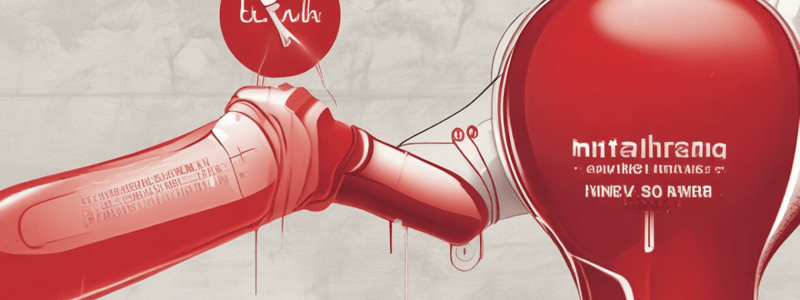Podcast
Questions and Answers
What is the minimum weight required for blood donation?
What is the minimum weight required for blood donation?
- 100 pounds
- 120 pounds
- 130 pounds
- 110 pounds (correct)
What is the universal donor blood type?
What is the universal donor blood type?
- O- (correct)
- A+
- O+
- AB-
How often can a donor give whole blood?
How often can a donor give whole blood?
- Every 28 days
- Every 60 days
- Every 42 days
- Every 56 days (correct)
What is a contraindication for blood donation?
What is a contraindication for blood donation?
What is the purpose of the registration step in the blood donation process?
What is the purpose of the registration step in the blood donation process?
Who benefits from blood donations?
Who benefits from blood donations?
Flashcards are hidden until you start studying
Study Notes
Eligibility Criteria
- Age: 17-65 years old (varies by country and organization)
- Weight: at least 110 pounds (50 kg)
- Hemoglobin: 12.5 g/dL or higher
- Blood pressure: within normal range
- Body temperature: normal
- No tattoos or piercings within the past year
- No infectious diseases (e.g., HIV, hepatitis)
Blood Types
- ABO blood group system:
- A
- B
- AB
- O
- Rh blood type:
- Rh positive (Rh+)
- Rh negative (Rh-)
- Universal donor: O negative (O-)
Blood Donation Process
- Registration: Donor registration and medical history review
- Screening: Blood pressure, temperature, and hemoglobin checks
- Phlebotomy: Blood collection (approximately 10-15 minutes)
- Post-donation: Rest and refreshments
Blood Donation Benefits
- Helps patients with:
- Anemia
- Cancer
- Surgery
- Trauma
- Supports medical research
- Saves lives
Blood Donation Frequency
- Whole blood: every 56 days (varies by country and organization)
- Platelets: every 7 days
- Plasma: every 28 days
Contraindications
- Recent travel to areas with high risk of infectious diseases
- Certain medical conditions (e.g., heart disease, diabetes)
- Pregnancy or breastfeeding
- Medication use (e.g., antibiotics, blood thinners)
Eligibility Criteria
- To donate blood, individuals must be between 17-65 years old, with a minimum weight of 110 pounds (50 kg)
- Hemoglobin level must be at least 12.5 g/dL, and blood pressure must be within the normal range
- Body temperature should be normal, and no tattoos or piercings should have been done in the past year
- Donors must not have infectious diseases such as HIV or hepatitis
Blood Types
- The ABO blood group system consists of four types: A, B, AB, and O
- Rh blood type is classified as either Rh positive (Rh+) or Rh negative (Rh-)
- O negative (O-) is considered the universal donor type
Blood Donation Process
- The donation process involves registration, review of medical history, and a brief medical examination
- Blood pressure, temperature, and hemoglobin levels are checked during screening
- Phlebotomy takes approximately 10-15 minutes to collect the blood
- After donation, donors are advised to rest and refresh themselves
Blood Donation Benefits
- Blood donations help patients with anemia, cancer, surgery, and trauma
- Donations also support medical research and save lives
Blood Donation Frequency
- Whole blood donations can be made every 56 days, while platelet donations can be made every 7 days
- Plasma donations can be made every 28 days, but frequency may vary by country and organization
Contraindications
- Recent travel to areas with high infectious disease risk, certain medical conditions, and pregnancy or breastfeeding are contraindications for blood donation
- Medication use, such as antibiotics and blood thinners, may also be a contraindication
Studying That Suits You
Use AI to generate personalized quizzes and flashcards to suit your learning preferences.




